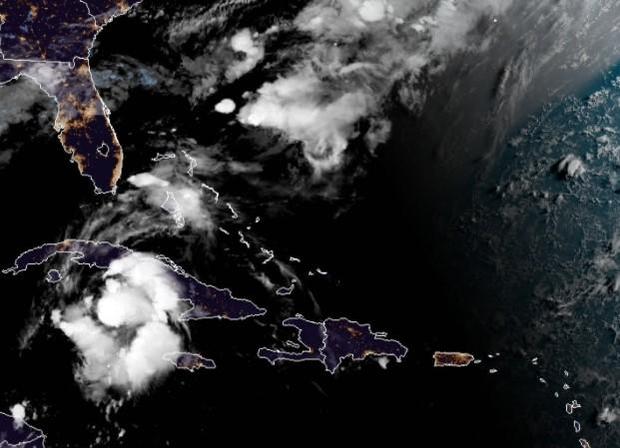Tropical Storm Elsa moves back over water and forecasted to take aim at Florida next
Tropical Storm Elsa made landfall along Cuba's southern coast Monday afternoon as forecasters said it could then turn toward Florida. As of Sunday night, the storm had moved back out over the water, but was still bringing heavy rain to Cuba.
Concern about possible high winds from the approaching storm was the reason officials in Surfside, Florida, ordered the demolition of the remaining part of the condominium building that partially collapsed. It was brought down late Sunday night.
President Joe Biden declared a state of emergency in Florida because of the storm, making federal aid possible. Governor Ron DeSantis had already declared a state of emergency in 15 counties, including in Miami-Dade, where Surfside is.
Nearly 9 million people in Florida were under tropical storm watches and warnings Monday after forecasters extended the tropical storm watch north along the state's western coast and the storm warning west along the Panhandle.
The U.S. National Hurricane Center in Miami said Elsa was "expected to move near the lower Florida Keys and the Dry Tortugas on Tuesday." The NHC said the storm is then expected to move "near or over" parts of Florida's west coast by late Tuesday and into Wednesday.
Five to 10 inches of rain were expected across portions of Cuba on Monday with up to 15 inches in some spots, the hurricane center said, adding that, "This will result in significant flash flooding and mudslides."
As of 11 p.m. ET on Monday, Elsa's center was some 20 miles north-northeast of Havana, scampering north-northwest at 12 mph. Elsa had maximum sustained winds near 60 mph, according to the National Hurricane Center, an increase from 50 mph earlier in the evening.
By Sunday, Cuban officials had evacuated 180,000 people as a precaution against the possibility of heavy flooding from a storm that already battered several Caribbean islands, killing at least three people. Most of those evacuated stayed at relatives' homes, others went to government shelters, and hundreds living in mountainous areas took refuge in caves prepared for emergencies.
The hurricane center said the storm was likely to gradually weaken while passing over central Cuba but "slight re-strengthening is forecast after Elsa moves over the southeastern Gulf of Mexico."
Elsa is the earliest fifth-named storm on record and also broke the record as the tropic's fastest-moving hurricane, clocking in at 31 mph Saturday morning, said Brian McNoldy, a hurricane researcher at the University of Miami.




